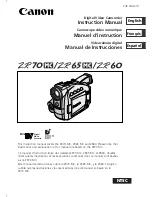
3-3
Fig. 3-3-2a EE/PB Y level
H. rate
Y level
(1) Connect the adjustment tool (H2) to the measuring point (D1).
(2) Apply the external trigger signal to D.FF (E) to observe the
PB color (colour) waveform at the measuring point (D2).
(3) Play back the signal (A3) in the mode (B1) of the align-
ment tape (A1).
(4) Set the VCR to the manual tracking mode.
(5) Adjust tracking so that the PB color (colour) waveform
becomes maximum. Make a note of the higher PB color
(colour) level as “B” at this time.
(6) Record the signal (A3) in the mode (B1), and play back
the recorded signal.
(7) Set the VCR to the EVR mode by transmitting the code
(F1) from the Jig RCU.
(8) Set the EVR address to (F2) by transmitting the code (F3)
from the Jig RCU.
(9) Transmit the code (F4) from the Jig RCU to adjust so that
the higher level channel becomes the specified value (G)
of the note "B" level as shown in Fig. 3-3-3b. (Adjust be-
fore recording, then confirm it by playing back.)
(10) After adjustment, record the signal (A3) then playing it
back again. At this time, confirm that there is no invert-
ing phenomenon or noise appearing on the playback
screen.
Fig. 3-3-3a LPF
1 k
Ø
39
µ
H
180
µ
H
120 pF
180 pF
PB. FM
629 [kHz]
PB COLOR
(PB COLOUR)
3.3.3
REC color (colour) level
Signal
(A1)
•
Alignment tape(S-VHS, SP/EP, Color(colour)
bar) [MH-1H]
(A2)
•
Ext. input
(A3)
•
Color (colour) bar signal [NTSC]
Mode
(B1)
•
S-VHS SP
(B2)
•
S-VHS EP
Equipment
(C)
•
Oscilloscope
Measuring point
(D1)
•
TP106 (PB. FM)
(D2)
•
PB color (colour) output of the LPF
External trigger
(E)
•
TP111 (D.FF)
EVR mode
(F1)
•
Jig code “57”
EVR address
(F2)
•
A : 02
(F3)
•
Jig code “20” and “22”
(F4)
•
Jig code “18” or “19” (C/-)
Specified value
(G)
•
SP: “B” x 125 ± 5%
•
EP: “B” x 125 ± 5%
Adjustment tool
(H1)
•
Jig RCU [PTU94023B]
(H2)
• LPF [PTU93006] (See Fig. 3-3-3a.)
Note:
• After adjusting, always perform the confirmation and
re-adjustment of the item 3.4.1.
Fig. 3-3-3b REC color (colour) level
V. rate
Specified
value (G)
(11) Release the EVR mode of the VCR by transmitting the
code (F1) from the Jig RCU again. (When the EVR mode
is released, the adjusted data is memorized.)
(12) Repeat steps (3) to (11) in the mode (B2).
3.3.4
Video EQ (Frequency response)
Signal
(A1)
•
Ext. S-input
(A2)
•
Video sweep signal
Mode
(B1)
•
S-VHS SP
(B2)
•
S-VHS EP
(B3)
•
Picture Control / Smart Picture
REC : Normal / Natural
PB
: Edit / Distinct
Equipment
(C)
•
Oscilloscope
Measuring point
(D1)
•
Y OUT terminal (75
Ø
terminated)
Frequency marker(D2)
•
3 [MHz]
External trigger
(E)
•
TP111 (D.FF)
EVR mode
(F1)
•
Jig code “57”
EVR address
(F2)
•
A : 03
(F3)
•
Jig code “20” and “23”
(F4)
•
Jig code “18” or “19” (C/-)
Specified value
(G)
•
SP: 2.8 ± 0.3 div. (–3 ± 1 dB)
•
EP: 2.8 ± 0.3 div. (–3 ± 1 dB)
Adjustment tool
(H)
•
Jig RCU [PTU94023B]
(1) Apply the external trigger signal to D.FF (E) to observe
the Y OUT waveform at the measuring point (D1).
(2) Record the signal (A2) in the mode (B1), and play back
the recorded signal.
(3) Set the VCR to the manual tracking mode.
(4) Set the VCR to the EVR mode by transmitting the code
(F1) from the Jig RCU.
(5) Set the EVR address to (F2) by transmitting the code (F3)
from the Jig RCU.
(6) Set the slope of the oscilloscope to the channel having
higher (D2) marker level of the Y OUT waveform [signal
(A2)]. Then set the 100 kHz marker level to the “4” scale
on the oscilloscope. In this condition, transmit the code
(F4) from the Jig RCU to adjust so that the (D2) marker
level reaches the specified value (G).
(7) Release the EVR mode of the VCR by transmitting the
code (F1) from the Jig RCU again. (When the EVR mode
is released, the adjusted data is memorized.)
(8) Repeat steps (2) to (7) in the mode (B2).
(7) Record the signal (A2) in the mode (B2), and play back
the recorded signal.
(8) Set the VCR to the manual tracking mode.
(9) Repeat steps (1) to (5) in the mode (B2).
(10) Record the signal (A2) in the mode (B3), and play back
the recorded signal.
(11) Set the VCR to the manual tracking mode.
(12) Repeat steps (1) to (5) in the mode (B3).
100 kHz
Four scale
1 MHz 2 MHz
Frequency
marker (D2)
Specified
value (G)
5 MHz
V. rate
Scale 4
(4 div.)
Fig. 3-3-4a Video EQ (Frequency Response)
















































